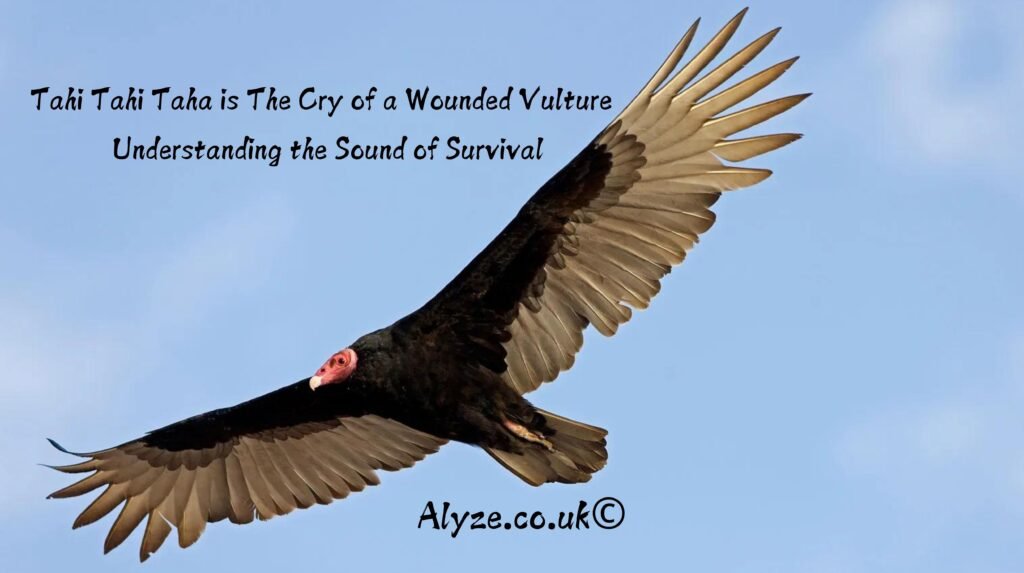Introduction
Tahi Tahi Taha Is The Cry Of A Wounded Vulture : Of these mysterious sounds which environ us in Nature, probably one of the most haunting calls is the “tahi tahi taha” cry, associable with a hurt vulture. The immediate repetition of this term is almost poetical and intrinsically evokes feelings of intrigue and awe. What is that to say, and why should it matter? With a view to placing “tahi tahi taha” as the cry of the wounded vulture, its origin, meaning, and context have been variously related to the cultural, ecological, and symbolic point of view.
Also Read : Mandy Bloemer and Midland States Bank: A Pillar of Financial Excellence
Tahi Tahi Taha Is The Cry Of A Wounded Vulture: Sound of Survival
The Biological Basis for the Call
Like most birds, vultures make a great deal of different sounds. Most of them are grunts and hisses. Several vocalizations in birds mean several things: a call to the mate, a warning to other birds, or a response to threat. So when one hears “tahi tahi taha,” it would appear that the vulture is in some kind of distress. In this aspect, such cries can be attempts at signaling pain or some sort of distress call to ward off predators or summon help. Where other birds sing melodious tunes, vultures will, of course, go for somewhat more primitive sounds that best fit them as scavengers and cleaners of the ecosystem.
Vultures are nature’s scavengers; hence, they clean up carcasses and, in the process, prevent disease spread. Such sounds formed part of the natural orchestra in different environments majorly where there was plenty of carrion material. Knowing these sounds enables us to understand their ecological significance and why they must be conserved. The cry of a vulture, in particular when it is injured, may mean not only individual suffering but something wrong in the balance of nature.
Cultural Value: Vulture in Folklore and Mythology
Symbolism Across Cultures
The vultures themselves hold great symbolism across diverse cultures. To some traditions within the Native American cultures, they are interpreters of life since they had the capacity for a vision from an elevated perspective. In ancient Egyptian mythology, there was created a symbolic association between the vulture and the goddess Nekhbet, meaning protector and carer. Much mysticism and respect accorded by cultures to these birds can be embodied in the expression “tahi tahi taha”. Thus, a crying vulture is perceived as a bad omen, a sign of approaching death, or rather an alarm to one’s soul when it is wounded.
Literature and Arts
Metaphor of the Cry Throughout history, the cry of the vulture has been used to express the inner self by many writers and artists.
It could be beckoning despair, struggle, or the harshness of survival for this vulture, wounded in literature. It is visceral, brought through humans’ most elementary fears and tender-heartedness toward the natural world. It is perhaps this hauntingness of “tahi tahi taha” that gets poems, stories, and even music writing set in motion by capturing the rawness in nature’s cries.
Ecological Concerns
The population of vultures has declined drastically due to which it is enlisted in the list of endangered species for its cause is poisoning, habitat loss, and human disturbance. A wounded vulture doesn’t cry only for itself but for its entire species. It symbolizes a cry amidst the broader struggle these birds face in a changing world.
The term “tahi tahi taha” will be beneficial in terms of making a rallying point for conservation effort, underscoring the nature of protection for these vital scavengers.
The Various Conservation Efforts and Associated Challenges Organizations around the world are involved in campaigning for the survival of these vultures through habitat preservation, restriction on hazardous drugs like diclofenac, and making society aware of the role that vultures play. These are the cries of an injured vulture: “tahi tahi taha.” These efforts remind our memory of how fragile these are, asking for continuous support for their survival. We are not doing it for the birds’ sake alone; as a matter of fact, saving these birds means saving entire ecosystems and other species dependent upon them for survival—the ones that have their stakes in their health, too.
Acoustic Ecology: The Study of Animal Sounds : Tahi Tahi Taha Is The Cry Of A Wounded Vulture
Understanding Avian Communication
The avian communication is a study on the various sounds birds make and what they actually mean. Tahi Tahi Taha Is The Cry Of A Wounded Vulture” falls under distress calls done by animals, which is a subject of study in finding out how they respond to pain, threat, and other factors. It will help acoustic ecology understand better the behavior and needs of vultures for the adoption of better conservation strategies.
These studies reviewed calls that provide some information about the health and status of the vulture population and the interaction with the environment. Impact on Human Perception: Animal vocalizations could go a long way in dictating how humans perceive them. The haunted nature of Vultures’ cry, such as “tahi tahi taha,” is misinterpreted or instills human fear that is followed with no sympathy or admiration for these beautiful birds. Making people understand the role of a vulture and what their cries signify can make an association with nature in people and a drive to protect these vital creatures.
Conclusion on Tahi Tahi Taha Is The Cry Of A Wounded Vulture
That Tahi Tahi Taha Is The Cry Of A Wounded Vulture is filled with much more depth than its apparent sound. It echoes from the struggle of the bird itself to the broader challenge posed before its species, from its ecological role to its cultural significance. Respect and understanding for these sounds shall allow us to begin embracing the vulture and their important role in maintaining the integrity of our ecosystem. While raising the cries of nature, so let us again remember our role in its protection and care, to make sure that not one of these echoes of “tahi tahi taha” ever falls into the silences of time. See More…



